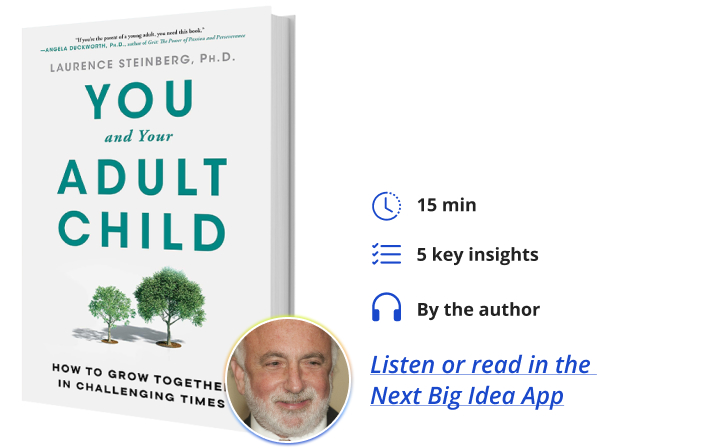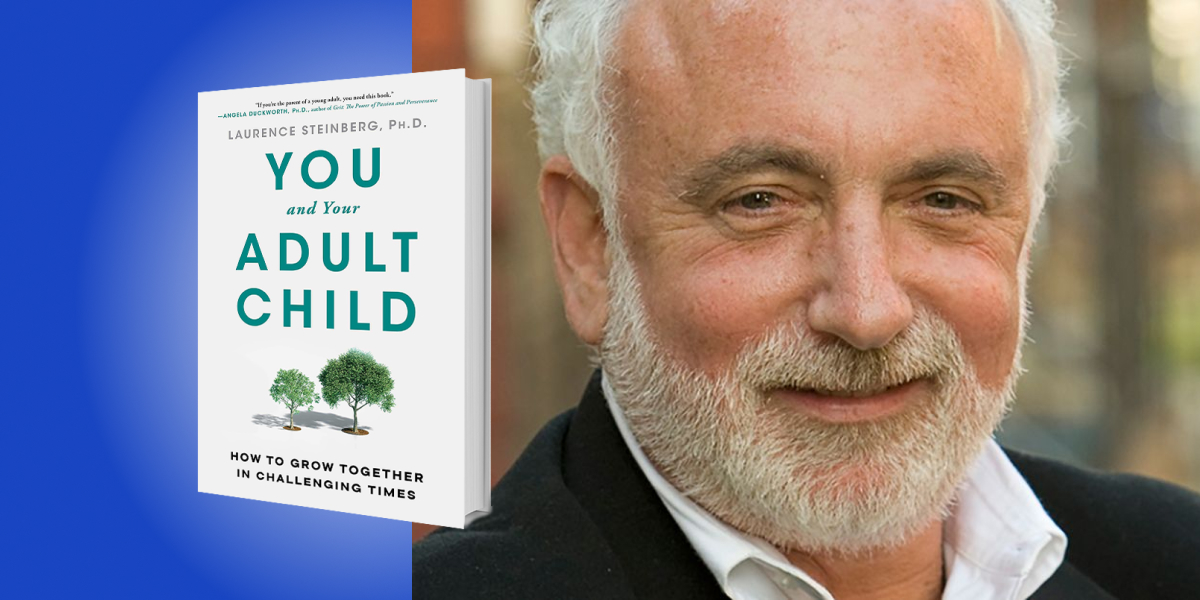Laurence Steinberg is the Distinguished University Professor and Laura H. Carnell Professor of Psychology at Temple University. He specializes in psychological development during adolescence and young adulthood, and has done research, writing, and teaching about this age period for nearly 50 years. His work has also appeared in many publications, including the New York Times and The Wall Street Journal.
Below, Laurence shares five key insights from his new book, You and Your Adult Child: How to Grow Together in Challenging Times. Listen to the audio version—read by Laurence himself—in the Next Big Idea App.

1. Parenting never ends.
The idea for this book came from folks at AARP, the national organization that supports and advocates for adults who are 50 and older. AARP had been hearing more and more from members who said they needed help with parenting their adult children. Many were unsure of what their role should be now that their child was grown. A lot of them were surprised by how difficult parenting was during this time. They were unprepared. They had assumed that the tough part of parenting was over, now that their child was no longer a teenager. They hadn’t realized that young adulthood brings its own set of challenges for parents, and they were searching for resources to turn to.
When asked if I was interested in taking on the project, I jumped at the chance. I had been thinking and writing about how adolescence was getting longer and the implications of delayed adulthood for young people’s development. But I hadn’t thought about the consequences of this change for their parents.
The more parents I spoke with, the more I came to see that they were surprised to discover that parenting never ends. They’re unsure of what their role should be. Today’s parents, unlike the previous generation’s, have been deeply involved in their children’s lives. They searched for a preschool as if it was a life-or-death decision. They assiduously attended back-to-school nights and soccer games. They edited—maybe even wrote—their kid’s college application essays. They stayed in touch, maybe even several times a day after their child went off to college. They wonder whether this degree of involvement is appropriate now that their child is an adult and they find it hard to break old habits.
2. Delayed adulthood is the new reality.
Times have changed. It takes young people longer than ever to make the transition into the conventional roles of adulthood: starting a career, developing a long-term committed romantic relationship, becoming financially independent, establishing their own residence, and becoming a parent.
How much longer does this transition take today than it did a generation ago? I used government statistics to compare the length of the transition into adulthood today with what it had been when their parents were making the same passage. For purposes of comparison, the age of college graduation marked the beginning of the transition, and the age at which people start a family marked its completion. Not everyone graduates from college or becomes a parent, but most people do, and I needed a way to quantify the length of the transition into adulthood in two different generations. And this seemed like a reasonable way to go.
“The transition into adulthood today is more than 50 percent longer than it was a generation ago.”
Today, it takes the average middle-class young adult about 13 years to go from college graduation to starting a family. It took the average person in their parents’ generation about eight years—in other words, the transition into adulthood today is more than 50 percent longer than it was a generation ago. Some people take this as a sign that young people have been coddled, and that they don’t really want to grow up. That they’d prefer to have their parents continue to support them while they take their time growing into adulthood. Personally, I don’t think this is the case, nor do I think there are any scientific studies that support this view.
One of the main reasons for delayed adulthood is the way in which the labor force has changed. Entry-level jobs require more education and training than they did in the past, which prolongs young people’s financial dependence on their parents. In turn, this delays starting a career, getting married, setting up a household, and becoming a parent. This is all compounded by the large and widening gap between salaries and the cost of housing.
Today, more young people live with their parents than was the case at the beginning of the 20th century—even at the height of the Great Depression. This is now the most common living arrangement for people in their twenties. Because this is a relatively recent development, at least in the United States, both generations are struggling to figure out how to make this living arrangement work.
3. “When I was your age…” is no longer a fair comparison for young adults of today.
One of the most common questions I get from parents with adult children is whether their child is floundering. It’s only natural for parents to gauge their grown child’s progress by comparing what their child has accomplished with where they, the parents, were when they were the same age. When they do this, it looks like their child is taking a much longer time to become an adult than they did. But because times have changed, the comparison doesn’t work. It takes more time and more money to become an adult these days. If parents don’t realize this, they’re apt to worry that it’s taking longer than they expected it would for their child to find themselves, become self-sufficient, settle down with someone, and start a family.
Many parents are concerned about this. They’re perplexed and confused. Some parents are worried that something is wrong. Others are annoyed that they are expected to assist their child financially longer than they had bargained for. It’s important to address some of these concerns and show parents that it’s normal for people to take longer to get their careers off the ground, become financially independent, get married, and start a family.
“If you are worried that your 30-year-old is taking too long to grow up, you should compare where they are with where you were when you were 25 years old.”
If parents insist on judging their child’s progress by using the timetable that they followed when they were growing up, they need to make an adjustment for today’s circumstances. They need to compare how their child is doing today with how they were doing when they were five years younger than their child’s age. In other words, if you are worried that your 30-year-old is taking too long to grow up, you should compare where they are with where you were when you were 25 years old.
Parents worry a lot that their grown kid is taking a long time to finish college, is having difficulty getting a career off the ground, is still unattached with few prospects for marriage, and has moved back home. Across each of these realms, parents are struggling to figure out whether their child is floundering or right on track in today’s world.
4. Bite your tongue.
We know that there are two periods in children’s lives when they really strive to establish and demonstrate their independence—toddlerhood and early adolescence. These are often trying times for parents. Their toddler is always saying “no,” even in response to their simplest requests. Their teenager argues with them about everything and debates the most trivial things ad nauseum.
Experts understand that what’s going on during these stages isn’t oppositionalism or defiance, but a reflection of the child’s normal need to individuate from their parents. The toddler wants to show their parents—and themselves—that they are an individual with a will of their own. The adolescent wants to prove that they have their own opinions, which don’t always align with their parents’, and they have the right to express them.
Additionally, however, there is a third struggle over autonomy that occurs around age thirty. At this age, the young adult wants to prove to their parents and to themselves that they are capable of being a competent adult on their own, without relying on their parents. One way in which they show this is by rejecting their parents’ advice and becoming annoyed when their parents try to give it.
“It’s important to remind yourself that when your adult child acts this way, it’s not about you.”
This is hard for many parents to take, because a lot of them have been very involved in their kid’s life all along. Now that same person is saying, I don’t want you to be so involved anymore. It’s important to remind yourself that when your adult child acts this way, it’s not about you. It’s their way of expressing their need for independence. When I told someone that I was working on this book, he joked that the leading cause of death among parents with adult children was a loss of blood from repeated lacerations of the tongue. My advice is that unless your child is about to do something that will cause grave and irreparable harm to themselves, their partner, or their child, keep your opinion to yourself.
5. Challenging times are happening for young adults in two senses.
The twenties and thirties are challenging times for young adults and their parents, and, in addition, the times we live in are incredibly challenging. People are especially vulnerable to mental health problems in adolescence and young adulthood. This is the most common period of life when problems like depression and substance abuse make their first appearance.
There are two reasons for this. First, as neuroscientists have discovered, the brain is still highly malleable, or “plastic,” during this stage of development, especially during the teens and early twenties. As a consequence, experiences have a more pronounced effect on the brain during this period than during childhood or later in adulthood. This makes people relatively more likely to be adversely affected by stress.
Second, because of all the transitions that are taking place during this time, young adulthood is a period when people are exposed to an awful lot of stress. There are all the major life changes that take place during this stage: finishing college, starting a career, finding a partner, setting up a household, becoming a parent. Moreover, the financial strains that young people face these days make what is an inherently demanding time all that more stressful. Then add the pandemic, the great recession, climate change… it’s a long list.
Many parents don’t recognize just how hard it is to be in your twenties or thirties these days. Let me close with a quick anecdote about two people with whom I worked closely, both in their late twenties. One was a producer and the other was a sound engineer. They listened carefully to me as I read the book and had me pause periodically to retake sentences that just didn’t sound right. Hearing me narrate the book was their first exposure to its content. Separately, each of them told me that their parents needed to read the book because they really didn’t understand them. I wrote this book for parents, but I think that, indirectly, it will benefit their adult children, too.
To listen to the audio version read by author Laurence Steinberg, download the Next Big Idea App today:































